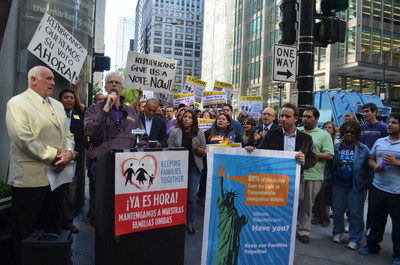For Immediate Release
Washington, D.C.—Today, the Immigration Policy Center held a tele-briefing to discuss who the 11 million undocumented immigrants living in the U.S. are and what lessons we've learned from previous broad legalization programs. The central question in the immigration reform debate for much of the American public will be how to create a pathway to legal status for the 11 million immigrants currenty living in the U.S. without authorization. How this pathway will be shaped turns on critical questions such as who are the unauthorized immigrants who would be attaining legal status? What would the impact be on the U.S. economy were so many unauthorized immigrants to be legalized?
The first answer is easier: undocumented immigrants are just like everyone else. They are adults and children, mothers and fathers, homeowners and churchgoers. And if they are put on a path leading to legal status, it would have a positive impact on communities and our economy. Workers with legal status earn higher wages, and these extra earnings generate more tax revenue for federal, state, and local governments, as well as more consumer spending, which sustains more jobs in U.S. businesses.
During the briefing, Sherri Kassoudji, Associate Professor of Social Work at the University of Michigan, explained some of the lessons about legalization learned from the Immigration Reform and Control Act of 1986 (IRCA). Providing a legal status to unauthorized immigrants led to higher wages for undocumented workers and native born workers alike, as well asincreased tax revenue and greater investment in their families and communities. “What legalizing the workers meant was that it was a fabulous workforce enhancement program,” Kassoudji said. And it meant that people could begin to prepare for their lives with legal status, especially for families with children. “These children could prepare for their futures just like everyone else,” she said.
About 2 million undocumented immigrants came to the U.S. as children, said Roberto G. Gonzales, Assistant Professor at the University of Chicago School of Social Service Administration, during the call. Half of them are now young adults, he explained. That means the undocumented immigrants who grew up in the U.S. internalize the ideas of the American Dream in school, but Gonzales said, “As they approach adolescence, as they see their friends get licenses, get first jobs, and they stay stuck, they experience a dramatic rupture in their life trajectories.” He added, “It really compels us to think of the benefits of legalization over the tragedies of exclusion.”
The 11 million undocumented immigrants make up about a third of the foreign-born population in the U.S., according to Rob Paral, Principal of Rob Paral and Associates. He said on the call the undocumented immigrants live all across the U.S. “When you look at undocumented immigrants, you need to look at the fact they live in families, they live in households,” Paral said, and these households can include legal residents and citizens. “It’s important to note that they [undocumented immigrants] are integrated in mixed families,” he said.
To view the reports the IPC released and re-released today, click the links below:
- Legalize Who? A Portrait of the 11 Million Unauthorized Immigrants in the United States (IPC Fact Sheet, 1/13)
- An Immigration Stimulus: The Economic Benefits of a Legalization Program (IPC Fact Sheet, 1/13)
- Back to the Future: The Impact of Legalization Then and Now (IPC Special Report, Republished 1/13)
- Economic Progress via Legalization: Lessons from the Last Legalization Program (IPC Special Report, 11/09)
For more information contact, Wendy Feliz at wsefsaf@immcouncil.org or 202-507-7524
The Immigration Policy Center (IPC), established in 2003, is the policy arm of the American Immigration Council. IPC's mission is to shape a rational conversation on immigration and immigrant integration. Through its research and analysis, IPC provides policymakers, the media, and the general public with accurate information about the role of immigrants and immigration policy on U.S. society. IPC reports and materials are widely disseminated and relied upon by press and policy makers. IPC staff regularly serves as experts to leaders on Capitol Hill, opinion-makers and the media. IPC is a non-partisan organization that neither supports nor opposes any political party or candidate for office. Division of the American Immigration Council.
Source: http://wfc2.wiredforchange.com/dia/track.jsp?v=2&c=mqCMVLD6MmAcPryNt5p53BO6pLCXCHwl
`







.jpg)


